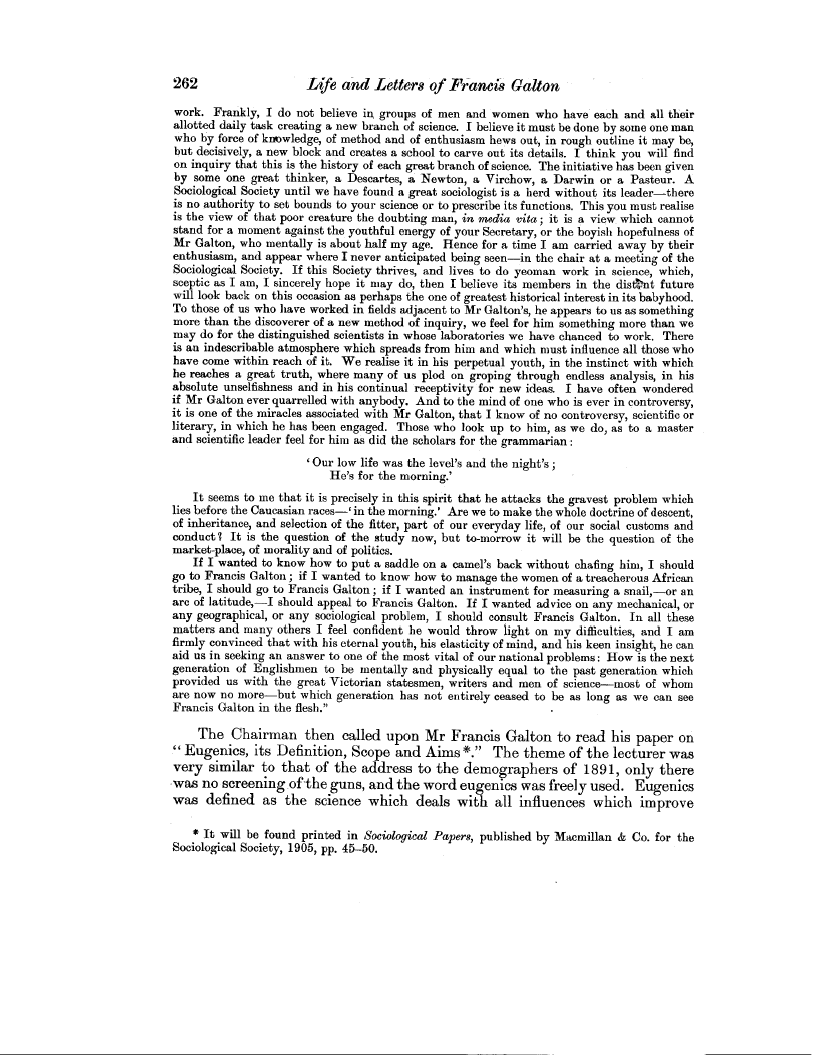| ||||||

OCR Rendition - approximate
262 Life and Letters of Francis Galton work. Frankly, I do not believe in groups of men and women who have each and all their allotted daily task creating a new branch of science. I believe it must be done by some one man who by force of knowledge, of method and of enthusiasm hews out, in rough outline it may be, but decisively, a new block and creates a school to carve out its details. I think you will find on inquiry that this is the history of each great branch of science. The initiative has been given by some one great thinker, a Descartes, a Newton, a Virchow, a Darwin or a Pasteur. A Sociological Society until we have found a great sociologist is a herd without its leader-there is no authority to set bounds to your science or to prescribe its functions. This you must realise is the view of that poor creature the doubting man, in media vita ; it is a view which cannot stand for a moment against the youthful energy of your Secretary, or the boyish hopefulness of Mr Galton, who mentally is about half my age. Hence for a time I am carried away by their enthusiasm, and appear where I never anticipated being seen-in the chair at a meeting of the Sociological Society. If this Society thrives, and lives to do yeoman work in science, which, sceptic as I am, I sincerely hope it may do, then I believe its members in the distant future will look back on this occasion as perhaps the one of greatest historical interest in its babyhood. To those of us who have worked in fields adjacent to Mr Galton's, he appears to us as something more than the discoverer of a new method of inquiry, we feel for him something more than we may do for the distinguished scientists in whose laboratories we have chanced to work. There is an indescribable atmosphere which spreads from him and which must influence all those who have come within reach of it. We realise it in his perpetual youth, in the instinct with which he reaches a great truth, where many of us plod on groping through endless analysis, in his absolute unselfishness and in his continual receptivity for new ideas. I have often wondered if Mr Galton ever quarrelled with anybody. And to the mind of one who is ever in controversy, it is one of the miracles associated with Mr Galton, that I know of no controversy, scientific or literary, in which he has been engaged. Those who look up to him, as we do, as to a master and scientific leader feel for him as did the scholars for the grammarian `Our low life was the level's and the night's ; He's for the morning.' It seems to me that it is precisely in this spirit that he attacks the gravest problem which lies before the Caucasian races-' in the morning.' Are we to make the whole doctrine of descent, of inheritance, and selection of the fitter, part of our everyday life, of our social customs and conduct? It is the question of the study now, but to-morrow it will be the question of the market-place, of morality and of politics. If I wanted to know how to put a saddle on a camel's back without chafing him, I should go to Francis Galton ; if I wanted to know how to manage the women of a treacherous African tribe, I should go to Francis Galton; if I wanted an instrument for measuring a snail,-or an arc of latitude,-I should appeal to Francis Galton. If I wanted advice on any mechanical, or any geographical, or any sociological problem, I should consult Francis Galton. In all these matters and many others I feel confident he would throw light on my difficulties, and I am firmly convinced that with his eternal youth, his elasticity of mind, and his keen insight, he can aid us in seeking an answer to one of the most vital of our national problems: How is the next generation of Englishmen to be mentally and physically equal to the past generation which provided us with the great Victorian statesmen, writers and men of science-most of whom are now no more-but which generation has not entirely ceased to be as long as we can see Francis Galton in the flesh." The Chairman then called upon Mr Francis Galton to read his paper on Eugenics, its Definition, Scope and Aims*." The theme of the lecturer was very similar to that of the address to the demographers of 1891, only there -was no screening of the guns, and the word eugenics was freely used. Eugenics was defined as the science which deals with all influences which improve * It will be found printed in Sociological Papers, published by Macmillan & Co. for the Sociological Society, 1905, pp. 45-50.
|